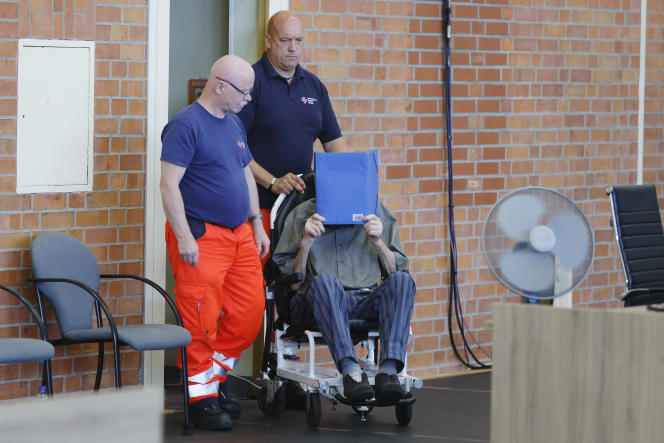Josef Schütz becomes the oldest accused of Nazi crimes at 101. This former concentration camp guard was sentenced on Tuesday, June 28, by German justice to five years in prison for “complicity in murder during his service in the Sachsenhausen camp” between 1942 and 1945 in Germany.
The President of the Brandebourg-sur-la-Havel Tribunal, Esto Lechtermann, stated:
Mr. Schütz, you were active for about three years in the Sachsenhausen concentration camp, where you were an accomplice to the mass murders. You were aware that prisoners had been killed there. By your presence, you supported [these acts]. Anyone wanting to flee the camp was shot. Thus, any camp guard actively participated in these murders.
When the sentence was announced, which is longer than the minimum of three years in prison for complicity in murder under German law, the defendant remained stoic. “I’m ready,” Mr. Schütz had said as he walked into the courtroom earlier, dressed in a gray shirt and pajama bottoms in a wheelchair.
Imprisonment unlikely
His lawyer had already announced that he would appeal in cassation in the event of a heavy sentence, postponing at best until the beginning of 2023 any application of it. But given the fragile state of health of Mr. Schütz, who appeared free since October, his incarceration seems unlikely.
Never during the thirty or so hearings, several times postponed due to his fragile health, has he expressed the slightest regret. On the contrary, on Monday, he again denied any involvement, wondering “why he was there”, and claimed that “everything is false” about him. Josef Schütz has advanced several, sometimes contradictory, stories about his past. “Everything is torn” in my head, he even slipped at the opening of the hearing before being interrupted by his lawyer.
Most recently, he claimed to have left Lithuania at the start of World War II for Germany, where he worked as a farm laborer throughout the conflict: “I pulled up trees, planted trees,” he said. he explained on the stand, swearing that he never wore a German uniform but “work overalls”. A version disputed by several historical documents mentioning in particular his name, his date and his place of birth proving that he had indeed been assigned from the end of 1942 to the beginning of 1945 to the SS division Totenkopf (“death’s head”).
“Complicity in Systematic Murders”
After the war, he was transferred to a prison camp in Russia and later settled in Brandenburg, a region neighboring Berlin. He was successively a farmer, then a locksmith and was never worried. Aged 21 at the start of the charges, he is notably suspected of having shot Soviet prisoners, of “aiding and abetting systematic murders” by Zyklon B gas and “by holding prisoners in hostile conditions”. .
During his indictment in mid-May, the Attorney General, Cyrill Klement, had considered “fully confirmed the evidence of the prosecution”, accusing him of not only having accommodated the conditions of the camp but of having done there. career. There is “no doubt that Mr. Schütz worked in Sachsenhausen”, he hammered, before requesting a sentence greater than the minimum of three years in prison for complicity in murder.
“A sentence of less than five years could only be accepted by the civil parties at the cost of great difficulty”, had judged in his closing argument Thomas Walther, the lawyer for eleven of the sixteen civil parties in this trial, including seven survivors.
Justice tardive
Between its opening in 1936 and its liberation by the Soviets on April 22, 1945, the Sachsenhausen camp saw some 200,000 prisoners, mainly political opponents, Jews and homosexuals. Tens of thousands of them perished, victims mainly of exhaustion from forced labor and cruel conditions of detention.
After long showing reluctance to try all perpetrators of Nazi crimes, Germany has been expanding its investigations for a decade. Camp guards and other executors of the Nazi machinery can be prosecuted on the charge of complicity in murder.
In recent years, four former SS men have been convicted in this capacity. This late trial makes it possible to “reaffirm the political and moral responsibility of individuals in an authoritarian context, and in a criminal regime, at a time when the neo-fascist far right is growing stronger all over Europe”, says Agence France-Presse Guillaume Mouralis, CNRS research director and member of the Marc-Bloch Center in Berlin.

















